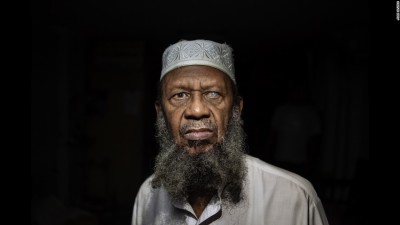
(CNN)Most of the images we see out of Cuba are similar — classic cars here, vibrantly colored buildings there. But Joan Alvado shows us something different. His photo series, “Cuban Muslims,” focuses on the lives of those who have converted to Islam.
“When I learned there was Islam and a Muslim community, I really liked it because I never heard of it,” Alvado said. “It was breaking all the preconceived ideas that we have about Cuban society.”
An estimated 85% of Cubans are Catholic. But only 0.1% of the population — just a few thousand people — are Muslim, according to a 2009 study by the Pew Research Center (PDF).
Alvado says almost all of them are converts.
“That applies to absolutely everybody in (my photo) series,” he said. “Many of them were Christians before or some other religion, or a few of them were atheists as well.”
He says the reasons for conversion vary. While some people view Islam as “a little bit more true or pure religion than others,” there are those who turn to Islam for more personal and specific reasons.
He provided the example of how Islam might be positive for those who have problems with alcohol, as Islam is a way for them to avoid alcohol. The Quran forbids the consumption of intoxicants and alcoholic beverages.
There are challenges, though, that come with practicing Islam in a country where it’s such a drastic minority. One of the main ones is finding a place to worship.
“The communities are being organized in very, very small groups, and someone in each group will offer their home on Fridays (to pray) or something like that,” he said.
Alvado says Cuban Muslims are constantly learning about their new religion and evolving together.
“Everyone is doing a little bit of their own interpretation on how to read (Islamic) rules and be with them, more or less, and that’s interesting,” he said.
One of his photos, No. 11 in the gallery above, shows a woman struggling to put on an Islamic scarf.
“This woman had been Christian all her life, really a devoted Christian for many, many years of her life,” he said. “That’s why, for me, (the photo series) is really speaking about identity and confusion.”
Alvado adds that this project was just as much of a learning experience for him.
“I have learned more things about Islam and Islamic beliefs and their ideas in Havana than working in Turkey,” the Spanish photographer said.
Cuba is a spiritual and passionate city, he said, especially when it comes to religion. In the beginning, he wasn’t sure how people would react to him wanting to photograph their lives. Working to develop a mutual respect and being open about his intents from the outset — such as by making sure his subjects knew he is atheist — was a significant part of his work.
Alvado says he will visit Cuba again later this year. When he told some of the people he photographed that he hopes to publish these images in a book one day, he says they reacted with excitement at the idea that other people would be able to see their experiences as Muslims in Cuba.
“I felt that they are wanting their story to be told, and it didn’t happen before,” Alvado said. “To see that they have these expectations about what can come out of it, it made me have a reflection about myself. You also have some sort of responsibility towards them about what you are going to do with this.”
Joan Alvado is a documentary photographer based in Barcelona, Spain. You can find him on Facebook and Visura.
END

Be the first to comment